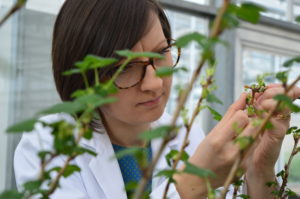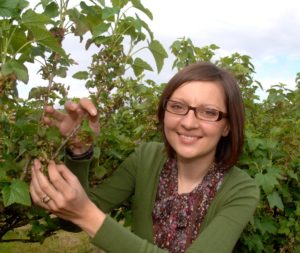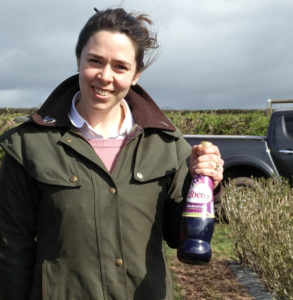LRS and JHI: in hunt for climate-resilient varieties
Lucozade Ribena Suntory (LRS) has invested over £500,000 in a five-year project with the Scottish James Hutton Institute to develop new varieties of climate-resilient blackcurrant.
LRS and the JHI: a long-lasting relationship
On the one side: Lucozade Ribena Suntory (LRS), one the leading soft drinks businesses in the UK and Ireland. On the other side: The James Hutton Institute, a world-leading, multi-site scientific organisation encompassing a distinctive range of integrated strengths in land, crop, waters, environmental and socio-economic science. Together, and of course with around 10.000 tonnes of blackcurrants harvested from British fields each year by the British blackcurrant growers, they keep up with consumer demand for Ribena.LRS, which uses 90 percent of the blackcurrants grown in Britain to make Ribena, has supported the globally recognised James Hutton Institute since 1991. They invested over £10 million to improve the sustainability and quality of British blackcurrant crops.Today, they are up to a new chapter of their common story: the research for climate-resilient blackcurrant varieties, to cope with the changes in the World’s climate.
Preparing the future with climate-resilient blackcurrants
 Previous research from the Institute has highlighted the threat that climate change poses to blackcurrant farming. As we all know, the plants need a period of sustained cold weather in the winter. Without the winter chill, they yield less fruit and have a shorter lifespan.The UK’s 10 hottest years on record have all occurred since 2002. Winters in the UK and all over the world are getting gradually warmer. This is one of the challenges that all blackcurrant growers will have to deal with. LRS and the James Hutton Institute have agreed to work hard on it over the next five years. They aim to develop varieties of blackcurrants that can cope with these climate changes.
Previous research from the Institute has highlighted the threat that climate change poses to blackcurrant farming. As we all know, the plants need a period of sustained cold weather in the winter. Without the winter chill, they yield less fruit and have a shorter lifespan.The UK’s 10 hottest years on record have all occurred since 2002. Winters in the UK and all over the world are getting gradually warmer. This is one of the challenges that all blackcurrant growers will have to deal with. LRS and the James Hutton Institute have agreed to work hard on it over the next five years. They aim to develop varieties of blackcurrants that can cope with these climate changes.
Strong commitment from two highly qualified women
Dr Dorota Jarret, who regularly participates in the IBA activities, is the soft fruit breeder at the Institute’s commercial subsidiary, James Hutton Limited, in charge of the blackcurrant breeding programme. “Development of climate-resilient varieties is high on the James Hutton Institute’s agenda. Blackcurrants are an important species in understanding the effect of climate change.”, she says.

PIC FROM DAVID MARTIN,FOTOPRESS,DUNDEE
James Hutton Institute-DOROTA JARRET
The LRS-backed research will also be on the lookout for berries with high anthocyanin levels. This compound gives berries their purple colour. Another focus of the breeders is the natural resistence towards diseases and pests.Harriet Prosser, who works as an agronomist at Lucozade Ribena Suntory, adds: “Sourcing local blackcurrants from British growers keeps food miles low. It allows us to trace every berry back to its field. Whenever someone buys a bottle of Ribena, they can be confident they’re helping to support biodiversity on our farms and research into the most sustainable ways of farming. I look forward to extending the purple patch that we’ve had with the James Hutton Institute for nearly three decades. We want to make sure that the UK’s blackcurrant farmers have a bright future.” “Together with LRS, we pursue a truly integrated approach. It satisfies the needs of the whole supply chain, from helping to secure the livelihoods of UK blackcurrant growers by improving sustainability of the crop, to ensuring the highest quality fruit for consumer satisfaction. Continuous investment from LRS is a forward-thinking move towards securing the future of the crop and we are delighted to play a part.’’, Dr Jarret declares.
“Together with LRS, we pursue a truly integrated approach. It satisfies the needs of the whole supply chain, from helping to secure the livelihoods of UK blackcurrant growers by improving sustainability of the crop, to ensuring the highest quality fruit for consumer satisfaction. Continuous investment from LRS is a forward-thinking move towards securing the future of the crop and we are delighted to play a part.’’, Dr Jarret declares.
Sustainable Blackcurrant growing
This partnership aligns with LRS’s Growing for Good vision. It includes commitments to both biodiversity and sustainability in line with the UN Sustainable Development Goal for Life on Land. Since 2004, LRS has worked closely with blackcurrant growers to put in place annual Biodiversity Action Plans. These ensure the protection of our environment as much as possible throughout the growing process.Blackcurrants have been bred at the James Hutton Institute since 1956. They now account for approximately half of the blackcurrants grown in the world. The varieties from this programme, probably the largest in the world, are instantly recognisable as they are all named after Scottish mountains and have the “Ben” prefix. James Hutton Institute varieties have an estimated 95% market share in the UK, and for the last 30 years, the majority of this crop has been used in the production of Ribena.For further knowledge:
LRS markets soft drinks brands including Lucozade Energy, Lucozade Sport, Fitwater, Ribena, Orangina and True Nopal Cactus Water. Its business is driven by the Yatte Minahare spirit: the spirit of ambition to dream big, take challenges, and never give up. LRS believes that their role is to have a positive impact on the lives of their consumers by providing them with a responsible choice of great-tasting drinks, enabling them to lead active lifestyles.
The James Hutton Institute has a staff of nearly 500 and 125 PhD students. It takes its name from the 18th-century Scottish Enlightenment scientist, James Hutton, widely regarded as the founder of geology and agronomist.